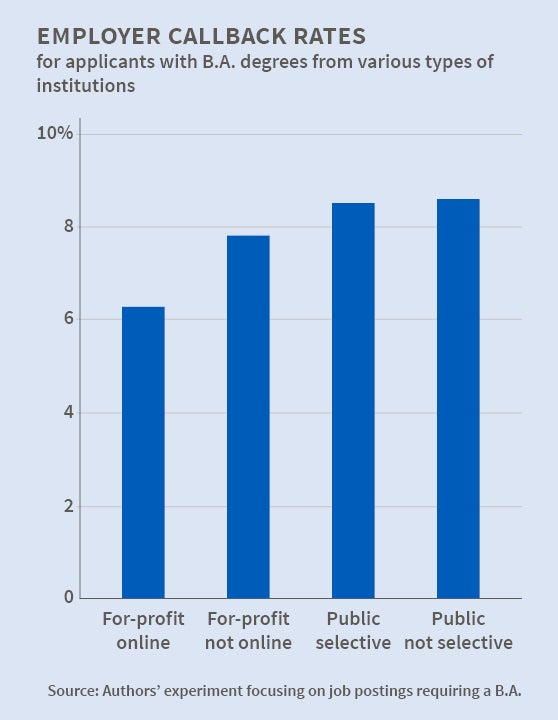The Value of Postsecondary Credentials in the Labor Market
There is little evidence that obtaining credentials from for-profit institutions improves the job prospects of workers who would otherwise not attend college.
Employers looking at applicants with bachelor's degrees in business are 22 percent less likely to call back graduates from for-profit online schools than those from non-selective public institutions, according to a new study comparing employer perceptions of public and for-profit institutions of higher education.
"These online, for-profit colleges have been responsible for 21 percent of the growth in all bachelor's degrees and 33 percent of the growth in bachelor's degrees in business over the last decade," write David J. Deming, Noam Yuchtman, Amira Abulafi, Claudia Goldin, and Lawrence F. Katz, authors of The Value of Postsecondary Credentials in the Labor Market: An Experimental Study (NBER Working Paper No. 20528). "Yet it is precisely the bachelor's degrees granted by the fastest-growing set of institutions that are associated with the worst callback outcomes for jobs requiring a bachelor's degree."
Between April and November 2014, the researchers used a large employment website to send 10,492 hypothetical résumés to employers posting business and healthcare-related openings in five major cities: Chicago, Los Angeles, Miami, New York, and the San Francisco Bay Area. For business positions requiring a bachelor's degree, the researchers sent four otherwise identical résumés for each position: two from local public universities varying by selectivity, one from a local for-profit institution and one from a national, online, for-profit school. The authors took an analogous approach in applying to business jobs not requiring a bachelor's degree and to healthcare sector positions. Of all résumés sent to job openings, 8.2 percent received a callback.
The rate of callbacks depended on the type of job being offered. For example, the preference for graduates of public universities over for-profits was clear for business job openings requiring a bachelor's degree. On average, 8.5 percent of applicants with a degree from a public institution received callbacks, in contrast to only about 6.3 percent of applicants with degrees from online for-profit schools. There was some variation among the for-profit schools, too, with employers preferring locally operated for-profit schools (7.8 percent callback rate) to the online for-profits.
For business job openings not requiring a bachelor's degree, there was no statistically significant difference by sector of postsecondary credential, and less than one percentage point difference for online for-profit bachelor's degree-holders relative to those with no postsecondary degree.
Employers offering jobs in the healthcare sector not requiring a certificate were 57 percent less likely to call back applicants with a certificate from a for-profit school than from a community college. For health jobs that did not require a credential, 8.9 percent of applicants with a public certificate got callbacks, compared with 4.2 percent of those with a for-profit certificate and 5.9 percent for those with no postsecondary degree. For jobs requiring a certificate, public certificates modestly outperformed for-profit ones, 5.8 percent to 4.9 percent.
The study found that that having a B.A. degree from a selective public university did not generate more callbacks, on average, than a degree from a non-selective public school. In fact, for low-paid business vacancies, the callback rate was modestly lower for the group with degrees from selective institutions. But for high-paid jobs, it was significantly higher. The authors conclude this indicates that "employers value both college quality and the likelihood of a successful match when contacting job applicants."
"Because yearly tuition at a for-profit college typically greatly exceeds that at a public university and for-profit degrees seem to be less valued by employers, the for-profit degree appears to be the less attractive investment," according to the authors. They note, however, that public colleges are often overcrowded and that for-profits may be able to more rapidly move into expanding fields not well-served by public institutions. In that case, the most appropriate comparison would be between a for-profit credential and no post-secondary credential. The study findings, however, provide little evidence that obtaining a for-profit credential will improve the job prospects of workers who would otherwise not attend college at all.
-- Laurent Belsie



